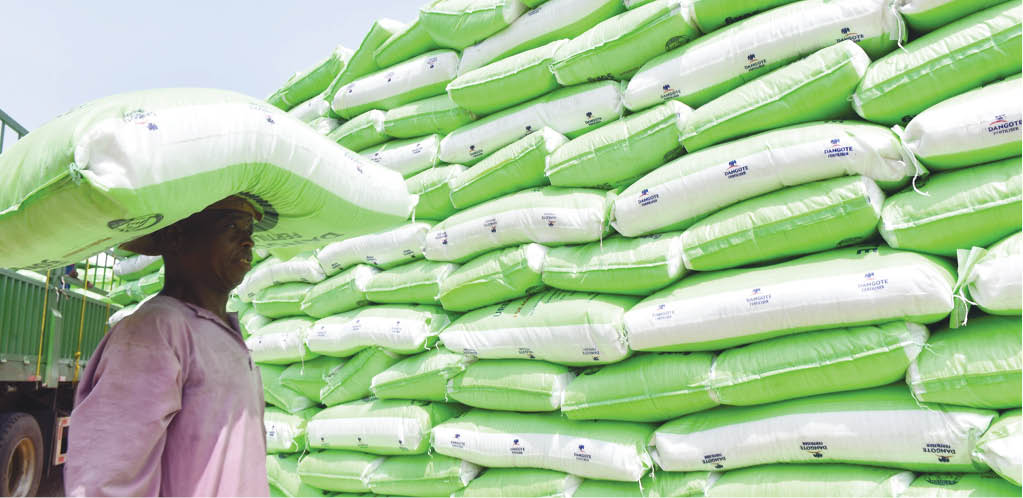Experts in the agricultural sector believe the new urea fertiliser released by the multi-billion naira Dangote fertiliser plant will aid the products availability in the country.
The Lagos-based fertiliser plant built by the Dangote Group began operation last week and it is designed to produce about three million tonnes of urea and ammonia fertilisers per year.
- Why Buhari’s directive on cattle routes is necessary, possible – Dr Momale
- Naira weakens to 4-year low as dollar sells for N502
With the development, experts are of the opinion that the entrance of the locally produced new brands into the market would help to crash the cost of the input as there would be no need to import them in the face of scarce forex.
Dr Abdullahi AbdulRasheed, an agricultural economist, believes that with the capacity of the Dangote plant and with the group’s distribution channels, there is high hope that the cost of fertiliser will be affordable even to the farmers in remote settlements.
Dr AbdulRashhed said, “Apart from improving the farmers’ income through improved yields, it will help to address the continuous increase in the prices of food that are being produced in the country.”
According to him, the coming of the plant will help check the activities of importers who always monopolise the sub-sector thereby creating artificial scarcity.
Farmers to pay N9,550 or more per 50kg bag
A 50kg bag of Dangote urea fertiliser will cost between N9,550 and N9,800 in any market; depending on the supply channel.
Our Agric Editor reports that at present the factory price per 50kg bag is N8,800.
A source told Daily Trust that Dangote trucks will charge N750 per bag to move the input to any part of the country; making the unit price to reach N9,550.
However, the source said if the input was to be supplied by commercial vehicles, the transport charge would be N1,000 per bag, and that in that case the market price per bag would be N9,800.
The source further said Dangote had released over 80 trucks supplying the new product to all parts of the country, except the North East, which requires security clearance before the fertiliser could be moved in.
A market survey shows that Indorama’s urea costs between N11,500 and N12,500.
We’ll give our assessment after harvest — Farmers
Reacting to the arrival of the Dangote fertiliser, the President of the All Farmers Association of Nigeria (AFAN), Arc Kabiru Ibrahim, said it would take some time to get it fully accepted by farmers as they could only give empirical feedback after harvest.
He said the price of Dangote urea was almost the same as Indorama’s and therefore too high for the smallholder farmers.
Although the farmers’ leader said as time went by and availability became sustainable, prices might come down due to competition.
However, for now, he said the price of farm produce would still be impacted in the same way as before the Dangote fertiliser hit the market, adding that the real impact would be felt at harvest, adding that the demand for urea was very likely to be met this year.
State of fertiliser sub-sector before Dangote’s entrance
Over the years, the fertiliser industry in Nigeria has been a tightly controlled monopoly, but with the Dangote fertiliser hitting the market last week, stakeholders believe the massive increase in aggregate supply will result in a sharp drop in the price of fertiliser in the country.
This will also eventually have a consequential impact on the general level of food prices which are currently beyond the reach of many.
Until recently, the fertiliser market had few players and suppliers; making it possible for them to take full control of the market.
The country, through Indorama and Notore, has capacity for producing about 1.5 million metric tonnes of urea.
According to statistics from africafertilizer.org, between 2015 and 2019, importation dropped significantly. In 2015, the import of all types of fertiliser stood at 419,991 metric tonnes, while in 2016, the figure went up to 596,010 metric tonnes. It further went up to 806,111 metric tonnes in 2017, and then the figure declined to 719,469 metric tonnes in 2018. By 2019, the figures collapsed to 133, 476 metric tonnes.
In the last one year, the price of NPK has jumped by more than 20 per cent to about N13,000 per 50kg bag, raising the bar of the cost of production and pushing food inflation to soar to about 23 per cent.
Last year, there was a little support by the government for the production of fertiliser, leaving farmers to find their way to get supply at exorbitant prices.
Fertiliser, just like every other produce, was bedevilled by middlemen in the distribution channel. Over the years, the cost of fertiliser has heavily been influenced by the middlemen, and because of the support of government, middlemen have taken advantage, and instead of making it available to local farmers, they prefer to export and make forex earnings.
With Dangote’s massive entrance into the fertiliser space, farmers like Muhammed Audu in Masaka on the outskirts of Abuja said they expected the price of fertiliser to drop by almost 40 per cent.

 Join Daily Trust WhatsApp Community For Quick Access To News and Happenings Around You.
Join Daily Trust WhatsApp Community For Quick Access To News and Happenings Around You.


